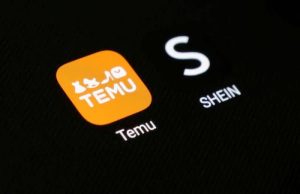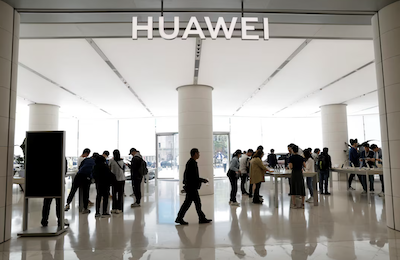China is spending billions on homegrown technology in a push to replace all Western-made equipment from critical sectors, and the move has proved to be a boon for Huawei and other US-sanctioned firms.
The push, having gained pace since last year, has seen Beijing spend heavily on replacing computer equipment, and sources say the telecom and financial sectors are set to be next in line.
The replacement drive has re-drawn entire sub-sectors of the software industry, data shows.
Also on AF: Nvidia to Stop Some AI Chip Exports to China Immediately
The combined China market share held by five major foreign makers of database management systems – the majority of which are American – dropped from 57.3% in 2018 to 27.3% by the end of 2022, according to industry group IDC.
The push to swap foreign-made technology with domestic alternatives comes as the US clamps down on high-tech exports to the country, and Beijing rushes to “avoid being strangled” by Western tech sanctions.
But the move is also motivated by Chinese President Xi Jinping’s increased focus on removing risks to national security.
‘Beware of US tech’
Tech researchers such as Mo Jianlei of the Chinese Academy of Sciences, the country’s largest state-run research organisation, said the Chinese government was increasingly concerned about Western equipment being hacked by foreign powers.
Over the past year, state-linked researchers also called on Beijing to strengthen anti-hacking defences in its financial infrastructure due to geopolitical concerns.
One March research paper highlighted the dependence of China’s UnionPay credit card system on US software firm BMC for settlements.
“Beware of security vulnerabilities in hardware and software set by the US side … build a financial security ‘firewall’,” the researchers wrote.
State-backed researchers also identified digital payments as particularly vulnerable to possible Western hacking, according to a review of their work. That makes a push to indigenise such technology likely.
Tenders also show domestic replacement projects this year are targeting markedly sensitive infrastructure.
Huawei, US-sanctioned firms gain ground
China’s long-running effort to build an independent computing system spawned state-owned companies that are now increasingly winning major contracts.
For instance, Beijing awarded two firms tenders to replace foreign-made computers in units linked to the People’s Liberation Army. Both were subsidiaries of China Electronics Corporation and China Electronics Technology Group Corporation — two firms heavily targeted by US sanctions.
Similarly, state-owned China Tobacco in July began switching some subsidiaries from Microsoft Windows to Huawei’s EulerOS, according to an employee of a software vendor that services the firm.
The switch came on the heels of a 2022 order from China’s state asset regulator to replace office software systems with domestic products by 2027. That was the first time such specific deadlines were imposed.
The order pushed state-owned enterprises (SOEs) away from US companies such as Microsoft and Adobe, according to an employee of a Beijing-based firm that develops domestic office-processing software.
Meanwhile, Huawei has since emerged as the leading firm in this replacement cycle, according to three people familiar with China’s enterprise tech industry.
In 2022, Huawei’s enterprise business, which includes software and cloud computing operations, reported 133 billion yuan in sales, up 30% on the previous year.
One of the people said privately-held Huawei was seen as more nimble than state-owned groups in rolling out products and executing projects.
The other two sources highlighted Huawei’s broad product suite – spanning chips to software – as an advantage.
Clients also prize Huawei for its ability to process data on internal company servers and external cloud networks, as well as its wide offering of cybersecurity products, according to the employee of a China Tobacco tech supplier.
View this post on Instagram
The switch in numbers
The number of tenders from SOEs, government and military bodies to nationalise equipment doubled to 235 from 119 in the 12 months after September 2022, according to a finance ministry database seen by Reuters.
In the same period, the value of awarded projects listed on the database totalled 156.9 million yuan, or more than triple the previous year.
That is only a fraction of nationwide tender bids, but it is the largest collection of state tenders publicly available and mirrors third-party data.
In 2022, China spent 1.4 trillion yuan ($191 billion) replacing foreign hardware and software, marking a year-on-year increase of 16.2%, data from IT research firm First New Voice shows.
China’s tech catch-up
Despite spending the big bucks, Beijing’s lack of advanced chip-manufacturing capabilities prevent it from completely substituting products with alternatives that are entirely locally made, analysts say.
China’s effort to build an independent computing system dates back to at least its 2006 five-year plan for science and technology development, which listed the semiconductor and software systems sectors as national priorities.
However, previous domestic substitution efforts stalled because China did not have the “technical chops to pull off localisation until now,” Kendra Schaefer, head of tech policy research at Beijing-based consultancy Trivium China, said.
“And to a certain extent they still kind of don’t.”
Western firms still in lead
Foreign firms still remain dominant suppliers for China’s banking and telecoms database management. Non-Chinese companies held 90% of market share for banking database systems at the end of 2022, according to EqualOcean, a tech consultancy.
Financial institutions are generally reluctant to switch database systems despite government pressure, said one industry source, adding that they have higher stability requirements than many other sectors and local players cannot yet match their needs.
Even for personal computers, banks that switch from an international brand to China’s dominant supplier Lenovo would still be reliant on critical chip components provided by Western firms, one industry source said.
An article published this year in the journal Cyberspace Security by researchers from the state-run China Telecommunications Corporation concluded the country was overdependent on chips made by US giant Qualcomm for back-end management, as well as on Apple’s iOS and Google’s Android systems.
“(They) are all firmly controlled by American companies,” the researchers wrote.
- Reuters, with additional editing by Vishakha Saxena
Also read:
US Chip Export Ban Seen as Big Opportunity for Huawei
US Curbs Set Off Sales, Tech Boom for China Chip Equipment Firms
ASML Employee Who Stole Chip Secrets ‘Went to Work at Huawei’
China Tensions Leave US Firms Between a Rock and a Hard Place
US Business Outlook in China Sinks, Firms Looking at SE Asia
China Says US ‘Repeatedly, Systematically’ Hacked Huawei – SCMP
























